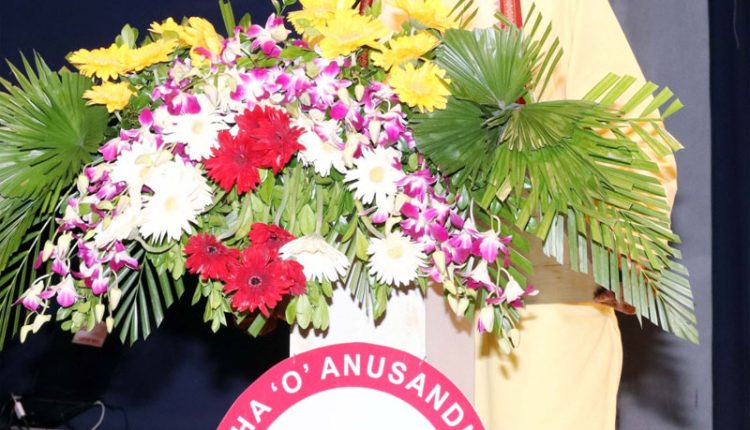Bhubaneswar, July 18: Faced with the challenge of climate change and its impact on the planet, small efforts to counter the fallout can lead to a transformation, a three-day international conference on sustainable agricultural development in the backdrop of climate change, was told on Thursday.
The transformation witnessed in the Hiware Bazar panchayat of Maharashtra’s drought prone Ahmednagar district which triggered a reverse transformation of migrant workers from cities to their once dismal landscape has been an eye opener, Mr. Popatrao Baguji Pawar, Sarpanch of the panchayat, said.
Experts from across the world are participating in the conference on ‘Sustainable Agricultural Development with Climate Smart Systems’ being held on hybrid mode at the Siksha ‘O’ Anusandhan Deemed to be University (SOA) here.
“Agriculture alone can provide engagement to the people and make reverse migration possible,” Odisha’s Deputy Chief Minister, Mr. Kanak Vardhan Singh Deo, who was the chief guest at the inaugural ceremony of the conference, said.

The conference has been organised by SOA’s Centre for Climate Smart Agriculture (CCSA) and faculty of Agricultural Sciences in collaboration with the local chapter of Indian Meteorological Society.
Mr. Singh Deo, who holds the Agriculture and Farmers’ Empowerment portfolio besides Energy, said water was becoming scarce and it was time to think about alternative agriculture.
Mr. Pawar, a social activist of repute who was decorated with the Padma Shri, said he motivated the inhabitants of a cluster of villages in his own Hiware Bazar panchayat to take up water and soil conservation projects in the area in a big way and farmers were earning Rs. 9 lakh per acre today which was more than twenty times of their earning earlier.
“Though global warming is impacting different regions with phenomena like cloud burst and drought, my panchayat has been insulated because there is no dearth of water due to proper ground water management,” he said adding ten lakh trees had been planted in the area over the last few years.
Mr. Pawar said there had been no reports of any farmer suicide in the area after the transformation took place.
Prof. Chittaranjan Ray, Director of the Nebraska Water Centre, Nebraska, USA and Prof. Pravat Kumar Roul, Vice-Chancellor of OUAT, also addressed the inaugural session which was presided over by SOA’s Vice-Chancellor Prof. Pradipta Kumar Nanda.
Mr. Singh Deo said though technology was needed to ensure more agricultural production, there was need to look at the use of chemical fertilizer as it was reducing the productivity of the soil. “While pursuing development, we have to think of the future generation,” he said adding “we need to go back to organic fertilizer which maintains and improves health of the soil.”

Referring to the thermal power plants operating in the state, he said the energy generated used fossil fuel which polluted the environment while overburden from coal mines filled up farm lands. The government had planned to implement the Surya Ghar scheme of the central government under which farmers would be supplied 300 units of electricity free of cost, Mr. Singh Deo said.
Mr. Ray described agriculture as a double-edged sword which provided food to humanity but at the same time contributed to global warming. The need was for a resilient agricultural system, he said adding the US government aimed to go carbon negative by 2050.
Prof. Roul said the fall out of climate change was for everybody to see as the five warmest years in the last 122 years since 1901 were experienced within the last 15 years. The years were 2009, 2010, 2016, 2017 and 2023, he said.
“Things are happening which has been crippling economic activities,” he said.
The need is to develop an effective system which will help farmers to cope with the situation, Prof. Roul said.
Prof. Nanda said that SOA had taken up climate change as one of its contemporary focused areas for research and CCSA was one of the 20 research centres set up by the university. SOA had signed a MoU recently with Pune-based Indian Institute of Tropical Meteorology (IITM) to study lightning and thunderstorm phenomena, he said.
Prof. Rabindra Kumar Panda, Director of CCSA, said the effect of year to year climate variability was affecting humanity while the extreme weather events occurring frequently were worrying.
Agriculture was worst hit by climate variability with regular occurrence of dry spells, heat wave and flash drought, he said adding the need was to reduce greenhouse gas emission while continuing with the conventional cropping system. Prof. Santosh Kumar Rout, Dean of faculty of agricultural sciences, proposed the vote of thanks.

